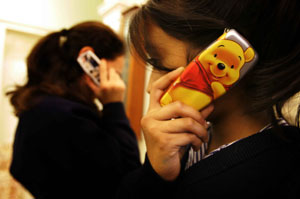Cell Phones And Brain Cancer
Mobile phones tumour risk to young children

CHILDREN under the age of eight should not use mobile phones, parents were advised last night after an authoritative report linked heavy use to ear and brain tumors and concluded that the risks had been underestimated by most scientists.
Professor Sir William Stewart, chairman of the National Radiological Protection Board (NRPB), said that evidence of potentially harmful effects had become more persuasive over the past five years.
The news prompted calls for phones to carry health warnings and panic in parts of the industry. One British manufacturer immediately suspended a model aimed at four to eight-year-olds.
The number of mobiles in Britain has doubled to 50 million since the first government-sponsored report in 2000. The number of children aged between five and nine using mobiles has increased fivefold in the same period.
In his report, Mobile Phones and Health, Sir William said that four studies have caused concern. One ten-year study in Sweden suggests that heavy mobile users are more prone to non-malignant tumors in the ear and brain while a Dutch study had suggested changes in cognitive function. A German study has hinted at an increase in cancer around base stations, while a project supported by the EU had shown evidence of cell damage from fields typical of those of mobile phones.
“All of these studies have yet to be replicated and are of varying quality but we can’t dismiss them out of hand,” Sir William said. If there was a health risk — which remained unproven — it would have a greater effect on the young than on older people, he added.
For children aged between 8 and 14, parents had to make their own judgments about the risks and benefits. “I can’t believe that for three to eight year-olds they can be readily justified,” he said.
David Hart, general secretary of the National Association of Headteachers, called last night for a ban on mobiles in schools.
Mobile phone companies reacted furiously, saying that the report fanned public concern without presenting new research. The youth market is highly lucrative because teenagers are more likely to use video downloads and other services.
The World Health Organization is preparing to publish an international report, drawing on hundreds of studies conducted over a decade, which many hope will give a definitive judgment on mobile phone safety.
The board’s report says that while there is a lack of hard information of damage to health, the approach should be precautionary. Sir William said: “Just because there are 50 million of them out there doesn’t mean they are absolutely safe.”
One school in the North East has begun using mobile scanners to prevent pupils using mobiles in class. “Outside college hours it is up to parents, but in our care if mobiles are found on children, they are confiscated and returned to the parents,” David Riden, vice principal of Tollbar Business and Enterprise College in New Waltham, said.
One group that appears to target young users is Richard Branson’s Virgin Mobile, which derives much of its revenue from the 16s-35s market. It denies targeting under 16s but has cornered a large slice of the youth market with cheap voice and text messages.
HEALTH RISK
- Acoustic neuromas are benign tumors of the acoustic nerve
- A study in Sweden has shown that they are twice as common in mobile phone users
- They were also four times as common on the side of the head where the phone was held
- Acoustic neuromas occur in 100,000 people a year and can cause deafness
- They can be treated by surgery. In most cases the patient’s hearing is saved
- Brain tumors affect about 4,700 new patients a year in Britain
- They are becoming more common — the UK Brain Tumor Society says that incidence has increased by 45 per cent in 30 years
- The causes of primary brain tumors are unknown, so it is hard to identify specific risk factors
Disclaimer










